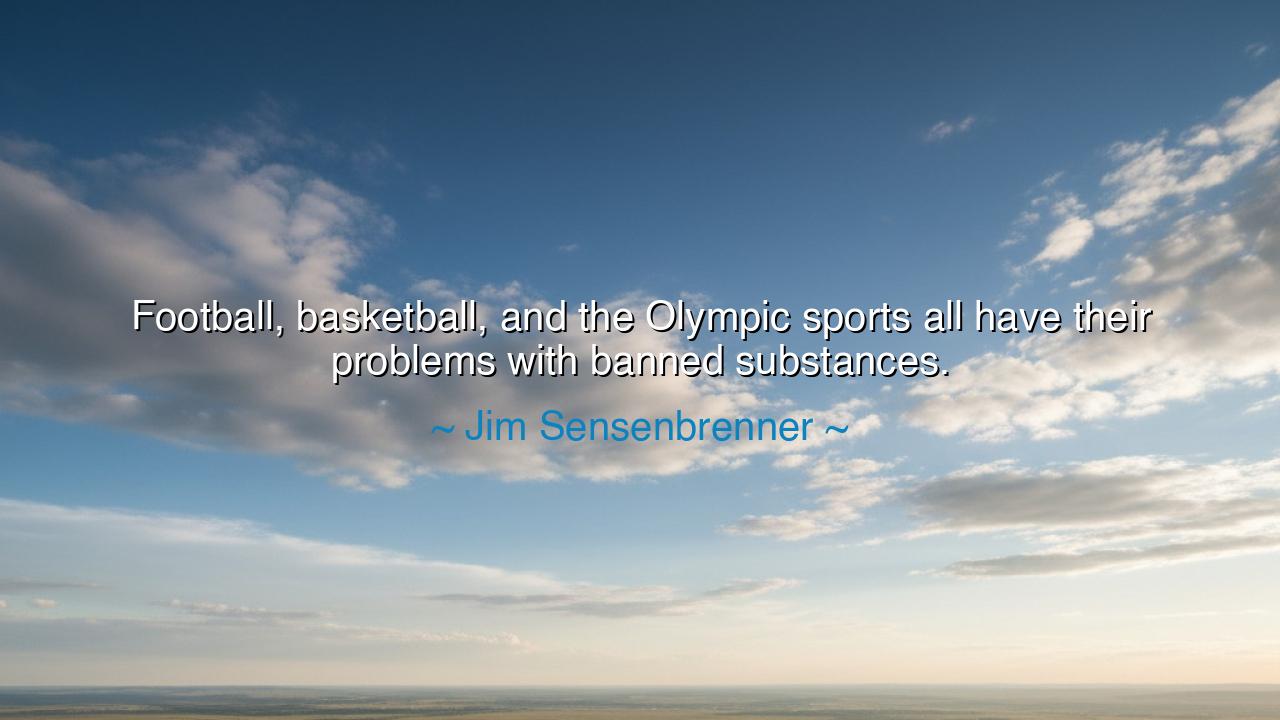
Football, basketball, and the Olympic sports all have their
Football, basketball, and the Olympic sports all have their problems with banned substances.






Hear the solemn words of Jim Sensenbrenner, who spoke with candor and gravity: “Football, basketball, and the Olympic sports all have their problems with banned substances.” In these few words lies a warning, not only to athletes but to all who walk the path of ambition. For he reveals that even the noblest contests, even the games that were born to honor the strength of the body and the spirit, are not free from corruption. The poison of banned substances enters not only the flesh, but the soul, for it tempts mankind to trade honor for false glory.
The meaning of his statement is both plain and profound. He does not condemn a single sport, nor a single man, but speaks of the universal frailty of human will. Where there is competition, there is temptation. Where there is glory, there is the shadow of deceit. Athletes who should rise on the wings of discipline and training are tempted instead to seize shortcuts, to claim power that has not been earned. And yet, when the medal is tarnished by dishonor, the victory becomes hollow, and the price is the loss of one’s very integrity.
The origin of this truth reaches back to the dawn of games themselves. In ancient Olympia, where the gods were honored through contests of strength and speed, men sometimes sought unfair advantage. The Greeks, despising dishonesty, erected statues called the Zanes, paid for by the fines of those caught cheating. These statues stood as eternal warnings: that dishonor in pursuit of victory stains not only the man, but the sacred ground upon which he stands. Thus, Sensenbrenner’s words echo an ancient truth—that sport without integrity is no sport at all, but mere spectacle.
Consider the modern tale of Lance Armstrong, once hailed as a titan of cycling, a survivor, a symbol of perseverance. For years, the world believed his triumphs were born of iron will and relentless training. Yet when the truth of doping was revealed, his victories crumbled like sand, and the adoration of millions turned to disillusionment. His story stands as a stark reminder of Sensenbrenner’s warning: that substances may grant momentary strength, but they steal the deeper victory—the victory of honor.
The lesson for us all is clear: greatness must be earned, not stolen. The path of discipline may be long and hard, but it builds strength of character as well as body. To rely on deceit, whether through drugs in sport or dishonesty in life, is to build a tower on sand. When the winds come, it will collapse, and all that remains will be shame. True victory, whether in the stadium, in the workplace, or in the heart, is found only in truth, endurance, and integrity.
Practical action must follow this teaching. Whatever your field, commit yourself to honesty. If you are an athlete, let your food, your training, and your sweat be your only fuel. If you are a worker, let diligence and skill, not deceit, be the source of your success. If you are a leader, show the way by choosing integrity over gain. Resist the whisper of shortcuts, for though they promise ease, they rob you of the only prize that endures: a clear conscience and a name untainted by dishonor.
And so, beloved listener, remember the wisdom hidden in Sensenbrenner’s words. Football, basketball, the Olympic games—every arena of life—all face their temptations, their “banned substances.” But the noble heart rejects them, choosing instead the harder road of truth. Walk that path, and though your victories may be fewer, they will shine brighter, for they are yours by right, unspoiled by deceit, eternal as the statues of Olympia that honor the honest and condemn the corrupt.






AAdministratorAdministrator
Welcome, honored guests. Please leave a comment, we will respond soon